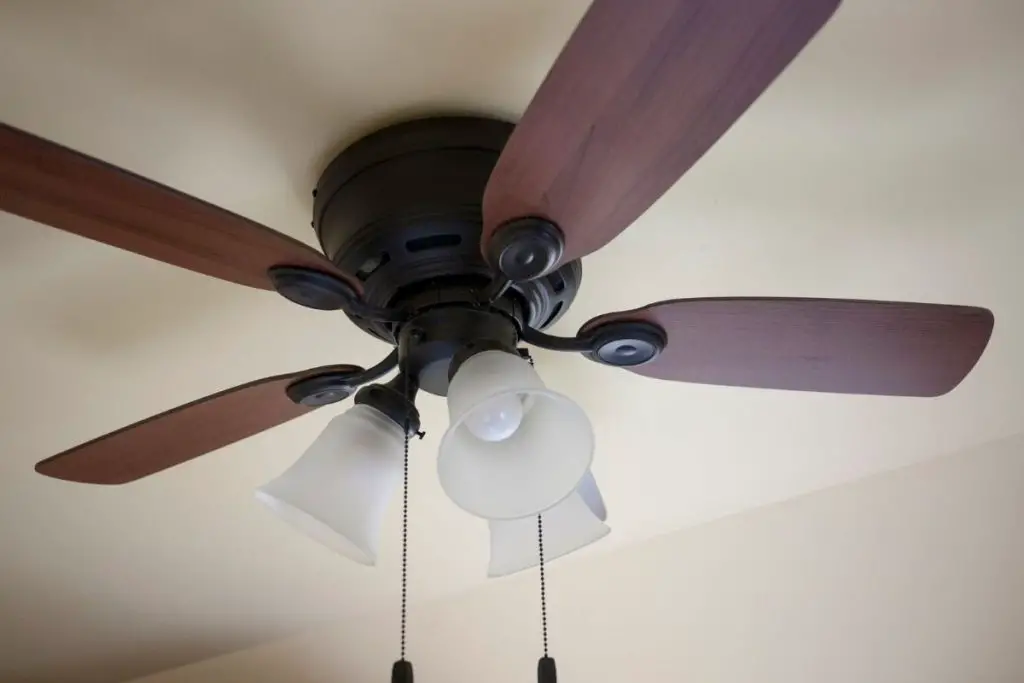For those of you who live in a hot climate and maybe have an air conditioner, ceiling fans are your best friend.
They will cool down the room by mixing the hot outside air with cooler inside air.
But what if your ceiling fan is making too much noise? This post will tell you how to quiet a loud ceiling fan, so it’s not annoying or disruptive when trying to sleep.
First off, identify the issue: Is it that the blades on your fan are turning too fast? Or could it be that they’re just old?
The problem might also lie elsewhere-the motor might need oiling or there may be something wrong with its bearings. Whatever the case may be, we’ll show you how to fix a loud ceiling fan.

In this case, the noise is from the blades not turning at all-they’re just scraping against something and touching together.
Try turning off your power to the ceiling fan at the breaker box. Grab a screwdriver and take your fan down by removing the screws that are holding in place each blade.
Hold a blade and try to turn it so the flat side faces up and down. If the blades are scraping against another part of the ceiling fan, adjust each one until they are not touching anything and there is distance between them.
You may also want to clean your ceiling fan by getting rid of any dirt/dust that has accumulated in between the cracks.
If your ceiling fan does not have a variable speed control or if you do not want to use the pull chain, try adjusting each blade so that it’s as close to parallel with the ceiling as possible without scraping against anything.
This method will help distribute the air more evenly and at a consistent speed.
Another common problem with ceiling fans is the motor needs oiling.
This method will work for most cases, when all else fails you may need to replace the broken part altogether.
Remember, different ceiling fans have different types of motors and usually only certain parts are replaceable.
It may take some time to get the right replacement part but it will be worth doing so in order to quiet your loud ceiling fan!
Also, if the noise is due to excessively fast blades then consider buying a whole new set of blades (and motor) for your ceiling fan.
This may be the most economical and effective solution to help quiet down your fan if it’s just old or in need of replacement parts.
Finally, remember that having a loud ceiling fan can dampen the mood during a romantic dinner or sleep.
Relax by installing a whisper-quiet LED light on your fan for some soft lighting while not disrupting you when you’re trying to relax!
Never hesitate to call an electrician when something seems wrong with your home wiring-it might seem silly at first but doing so could save you from a very dangerous situation.
You don’t want to be responsible for any injuries/damages that occur as a result of being unaware about how electricity works in your household. If you’re unsure about what to do, stay safe and play it safe by giving a local electrician a call.
Electricians are responsible for the installation and maintenance of electrical systems so they can help you with any problems that arise (as well as preventative measures).
If you’re not sure where to start or aren’t comfortable doing this yourself then you should definitely give an electrician in your area a call-they’d be more than happy to help.
Final Words
Ceiling fans are a great way to keep cool and distribute air more evenly throughout rooms.
They can also help save in heating costs during the winter and reduce humidity by pulling moist air down from the ceiling at certain times of the year.
Installing, maintaining, or repairing your ceiling fan is fairly simple if you follow these tips and take the necessary precautions.
If you have any doubts then you should always call in a professional so they can help resolve the issue for you.
If your fan is making strange or loud sounds then take it upon yourself to inspect each individual blade and see if anything seems out of place, warped, or damaged-this might be the underlying problem.
Read Next
- 10 Tent Camping Tips for Easy Camping
- 10 things you need to know before learning to scuba dive
- 15 places you must scuba dive in the world
- 7 Tips to Navigate the Delicate Art of Painting Your Side of a Neighbor’s Fence
- A Comprehensive Guide on How to Quiet a Metal Roof from Rain
- Are camping cots comfortable?







